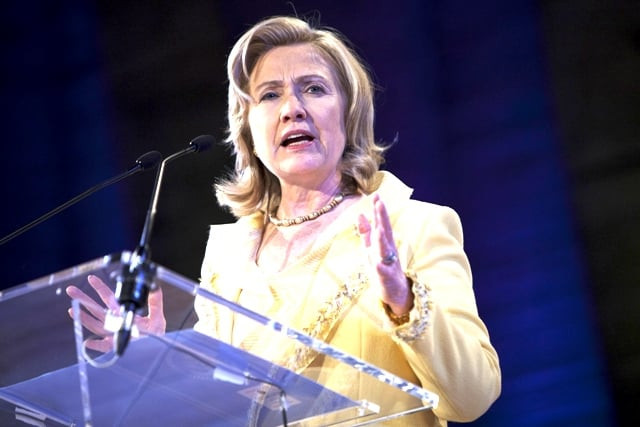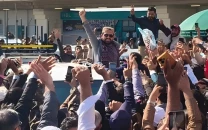As Clinton arrives, key talks on Pak-US ties begin
Hillary Clinton arrives in Pakistan on a surprise visit to resolve tensions raised by the killing of Bin Laden.

Key officials in the federal capital hope to “rewrite” terms of engagement between Pakistan and the United States in anti-terror cooperation at crucial talks to be held on Friday (today) among top civilian and military authorities of the two countries in Islamabad.
Meeting amidst a recent thaw following a period of severely strained ties between the two countries, Secretary of State Hilary Clinton will lead the US delegation at the negotiations with the Pakistan’s civil and military leadership.
Clinton will be assisted by senior US officials, including Chairman Joint Chiefs of Staff Admiral Mike Mullen, who arrived in the capital on Thursday evening.
The arrival of Clinton was being “kept under wraps” for security reasons. But sources say she is due to land in Islamabad early Friday morning.
Diplomats termed Friday’s talks ‘highly significant,’ going as far as to state that the fate of relations between Pakistan and the US will hinge on these discussions.
“The two sides will push for reviewing and rewriting their anti-terror cooperation,” remarked a Foreign Office official, who asked to remain anonymous.
“There is no doubt that the two countries have certain misgivings; but the two sides will try to narrow down differences,” the official added.
The talks come just after a marathon session of Pakistan’s high-powered defence committee of the cabinet on Wednesday. Following the session, Prime Minister Yousaf Raza Gilani had stated that his government will use ‘all appropriate means’ to target militant hideouts inside the country.
The committee’s tough stance is seen to have been taken in anticipation of difficult questions from Secretary Clinton.
Pakistan also appears to have accepted certain demands made by Washington. It granted US interrogators access to Osama bin Laden’s widows and returned the wreckage of the US stealth helicopter that was used in the Abbottabad incursion.
Reports also indicate that the American Central Intelligence Agency (CIA) has also agreed to share data it seized from Osama’s compound with the Inter-Services Intelligence.
Despite posturing and apparent tensions in relations, the Pakistani officials expected that Secretary Clinton’s visit will help normalise ties.
The most significant step towards initiating a thaw came on on Wednesday, when US President Barack Obama and UK Prime Minister praised Pakistan’s role in fighting terrorists.
And just hours before leaving for Islamabad, the US Secretary of State at a news conference in Paris also struck a reconciliatory note underlining the importance of Pakistan’s to stabilise Afghanistan.
‘US must keep strategic ties with Pakistan’
Working with Pakistan is a strategic necessity for the United States, US Secretary of State Hillary Clinton said on Thursday in Paris, even as she pressed Islamabad to act more decisively on counter-terrorism.
Praising Pakistan as “a good partner” in global efforts to fight terrorism, Clinton sought to blunt US anger at the discovery that al Qaeda leader Osama bin Laden lived there for years before US commandos killed him in a raid on May 2.
Clinton acknowledged that the two countries have disagreed on how hard to fight al Qaeda, Afghan Taliban fighters and other militants, but made clear she saw no choice but to work with Pakistan, saying it would overcome “these near-term challenges”.
Among those challenges is Pakistan’s decision to tell the United States to halve the number of military trainers stationed in the country, the latest sign of growing distrust.
“We do have a set of expectations that we are looking for the Pakistani government to meet but I want to underscore, in conclusion, that it is not as though they have been on the sidelines,” Clinton told a news conference in Paris.
“They have been actively engaged in their own bitter fight with these terrorist extremists.”
“There have been times when we have had disagreements. There have been times when we’ve wanted to push harder and for various reasons they have not. Those differences are real. They will continue,” Clinton said.
“But the fact of the matter is that the international community has been able to kill more terrorists on Pakistani soil than anyplace else in the world,” she added. “We could not have done that without Pakistani cooperation.” She appeared to be referring to US drone attacks and covert action against militants.
“I believe strongly it is in our national security interest to have a comprehensive, long-term partnership with the government and people of Pakistan,” Clinton said.
Some security analysts make the case that a half-hearted Pakistani partner is better than none.
“Despite this affront (bin Laden’s presence in Pakistan), the United States should recognise the importance of maintaining Pakistan as an unpalatable friend rather than an implacable adversary or, worse, seeing it tumble toward becoming a failed state,” the Washington-based Centre for a New American Security think-tank said in an analysis this month.
Among other things, the United States wants Pakistan to help promote reconciliation in Afghanistan so as to help the United States begin to withdraw US troops in July and completely hand off security responsibility to Afghans in 2014.
WITH ADDITIONAL INPUT FROM WIRES
Published in The Express Tribune, May 27th, 2011.



















COMMENTS
Comments are moderated and generally will be posted if they are on-topic and not abusive.
For more information, please see our Comments FAQ